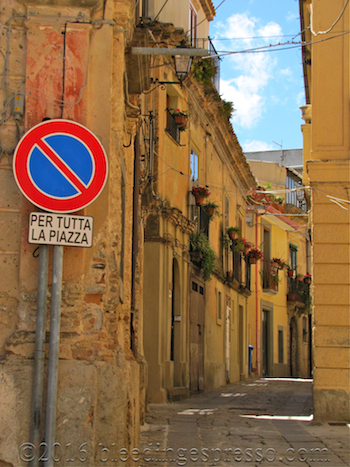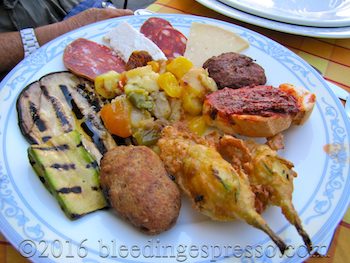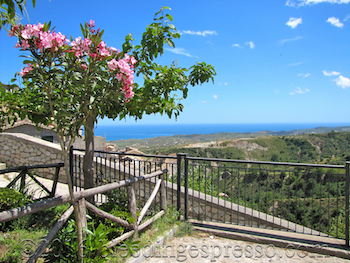5 Things No One Told You About Moving to Rural Italy
 Moving to Italy? Awesome!
Moving to Italy? Awesome!
Rural Italy? Let’s talk.
No matter where you land in Italia, there will be new, let’s call them “experiences.” Some are universal like dealing with Telecom or ENEL (even Italians hate these interactions) or handling other bureaucracy such as getting your permesso di soggiorno (stay permit).
And actually some of those things can be less stressful in rural areas because there are simply fewer people around to wait in line all the live-long day.
But the flip side is that there are some unique challenges to living in rural Italy you may not have heard about. And that’s where this handy list comes in.
Disclaimer: I already know some expats in Italy will read this and think, “OMG where do you live, The Dark Side of the Moon, Calabria?” Well, yes, basically, so this is my experience and mine only. YMMV.
1. You’ll lose your English.
No, you’re not going to suddenly start babbling incoherently on Skype with your friends and family, but moving to rural Italy probably means you’re going to be using and hearing your mother tongue a lot less often. And that, in turn, means you’ll soon find yourself, when with English speakers, saying things like, “Oh you need to take that to the . . . um . . . crap, what’s the word in English? It’s lavanderia in Italian . . . ”
Sure, this can happen to anyone who has moved to Italy, not just the rural parts, but the more remote your village, the faster this will occur. Do not be alarmed. It’s entirely normal, though be forewarned: your most judgmental “friends” back home will probably just think you’re being pretentious. Whatevs. The struggle is real.
2. You will become a morning person.
As a former night owl, this one is perhaps the most surprising (and disturbing), but it’s inevitable if you live in an area of Italy where everything (and I mean EVERYTHING) closes between the hours of 12ish and 5ish.
If you’re not up and out by ten a.m. or so, you’re just not going to get your errands done, especially if the post office is involved because it doesn’t even have afternoon hours. Doctors also seem to prefer la mattina, and you’re likely to have an appointment at opening time just like everyone else–which means trying to arrive before the nonne. Good luck with that.
Yes, some things you can do in the evening, but anything remotely bureaucratic is almost exclusively scheduled for morning. Of course now I have a toddler, so that’s a whole other “morning person” issue, but I’m talking pre-Baby Espresso.
3. Your life will revolve around food.
Everyone knows that Italians love food, but it’s hard to overstate how much of your time will be spent thinking about food, especially figuring out what you will eat at the next meal — or if it’s a weekend, what you will eat for the next couple days.
 This is for several reasons. For one, in rural Italy, fast food can be quite a distance away (and often not worth the effort). Also, most food is bought fresh or at least within a few days of when you want to use it. Preservatives aren’t nearly as common in everyday food here, and people don’t tend to buy in bulk unless you’re talking cans of tomatoes or pasta or the like. Storage space tends to be sparse.
This is for several reasons. For one, in rural Italy, fast food can be quite a distance away (and often not worth the effort). Also, most food is bought fresh or at least within a few days of when you want to use it. Preservatives aren’t nearly as common in everyday food here, and people don’t tend to buy in bulk unless you’re talking cans of tomatoes or pasta or the like. Storage space tends to be sparse.
So all of this means you’re usually buying what you will eat within a few days of consuming it. No lunchmeat that sits in your fridge for two weeks, and bread? Yeah, that starts to go downhill before you even get it home.
Throw in the aforementioned limited store hours, including many options being closed on Sundays, and well, you’re thinking about what food you need in your house ahead of time. And that leads to a near constant obsession of what you’ll be eating in the near future. I’m planning dinner tomorrow as I type this.
I should add that although you might find yourself with an empty fridge on occasion, the huge upside to this is that you will likely be eating better quality food than you used to — possibly only because you have to — but still, win.
4. You will miss the weirdest things at the weirdest times.
Anyone moving to rural Italy knows very well that the ethnic food scene is lacking (and by lacking I mean non-existent). Sometimes you can find similar ingredients and make passable substitutes, but many expats in rural Italy end up saying arrivederci to restaurant sushi, Thai food, guacamole . . . .
Moment of silence, please.
We know this, and we deal. But what I didn’t realize was that I was going to miss being able to, say, put on a silly morning talk show like “Ellen” and go about my business. I work from home and sometimes you just want that background noise to be familiar voices in your native language. Sure, you can put on a YouTube video, but it’s not the same.
Other things I missed that I hadn’t anticipated: big bookstores with built-in coffee shops and couches; libraries; some flat terrain for biking, running, walking (I live in a hill town — it’s ALL hills!); the ability to stop somewhere when dying of thirst in the summer and pick up a fountain drink with ice and a straw.
None of these “break” the expat experience per se, but they can make me oddly nostalgic when I least expect it — even after years abroad.
5. You will find out you’re stronger than you ever imagined.
Moving to Italy, whether your new home area is rural or urban or anywhere in between, is hard, especially if you’ve done it alone but even if you have company. You will get lonely, you will get sad, you will wonder why the hell you have to make everything so freaking hard and wouldn’t you just have found a way to be happy in your old life?
 And then you will dig deep, deeper than you even knew was possible, and if your expat life is truly what you want, you will build it. From scratch, most likely. You will figure out how to make it work.
And then you will dig deep, deeper than you even knew was possible, and if your expat life is truly what you want, you will build it. From scratch, most likely. You will figure out how to make it work.
You will embrace your rural, crazy, nosy Italian community and enjoy the silence, simplicity, and calm it provides.
You’ll still feel sad and lonely and such from time to time — sorry, no magic cure for being human — but you’ll also know you are strong enough to do pretty much anything you set you mind to.
Even if you still hate going to the post office and would give up your What’s App for sushi.
*
 Check out the other Italy Blogging Roundtable posts on the topic FIVE in honor of the group’s five-year anniversary this month. Auguri Roundtable!
Check out the other Italy Blogging Roundtable posts on the topic FIVE in honor of the group’s five-year anniversary this month. Auguri Roundtable!
- Jessica of Italy Explained: 5 Autonomous Regions of Italy
- Gloria of At Home in Tuscany: The Tuscany Cinquino
- Rebecca at Brigolante: Lake Trasimeno with Kids: Five Suggestions for a Family-Friendly Visit
22 Beans of Wisdom to “5 Things No One Told You About Moving to Rural Italy”
-
[…] Bleeding Espresso – 5 Things No One Told You About Moving to Rural Italy […]... brigolante.com/blog/2016/05/lake-trasimeno-umbria-with-kids















Wow! Great post! I lived in a mid-sized town for a couple of years and then a small city, but I could really relate. The losing English seems to happen incredibly quickly. Even though I spent a good bit of my time teaching English, I still stammered when I got on the phone with relatives. Of course, although I was technically speaking English, it was not only extremely slowly, but I was constantly filtering vocabulary to make sure I was being understood. I never did become a morning person and I can tell you it put me into difficulty with having food on hand. And like you say, it all made me stronger!
michelle Reply:
May 21st, 2016 at 8:39 pm
Thanks Karen! The English does go quickly — pretty funny how it becomes soooo natural to say “ciao” especially hahaha…..
Ditto all of the above for my five years in rural Haiti. I still cannot always speak correctly here in the USA and I have had to be back for 18 years now. Likely due to fully embracing that life & language. The people in our little local market finally understand my shopping 4-5 days a week for just a few things. People don’t look at me so weirdly as they did the first five years back here; cadence & syntax have finally readapted. My heart has a big chunk for anywhere away and small, and rural. I still have no desire to watch TV on a daily, weekly or monthly basis. Living abroad changes you, but for the better for sure! Thanks for your insight and love for Italia Michelle!
michelle Reply:
May 21st, 2016 at 8:38 pm
Thanks so much for sharing your experiences, Joy. I don’t think it takes very long at all for living abroad to change you — would be interesting to look back and really document the changes after a month, two months, etc.
your posts take me home to Italy……………24/7 shopping and entertainment is one part of the USA I miss when I am in Italy longer than 1 or 2 months………but then I would never meet 5 different locals when I am out buying ingredients for that nights supper!
During a 3 month sabbatical to ‘test’ life in Italy I found it was difficult to make friends. Everyone returns home to have meals with the family so going out to lunch was not an option
Unless you speak Italian it is not possible to sign a cell phone contract, have a political discussion, ask questions beyond dove and come…….
Designated line and parking rules………..
going to a movie I would understand
but all the differences are what make life in Italy so wonderful: if you must shop every day you have contact with your neighbors every day
walking is another great part of living in Italy…………….get out of a car and you see things
something I have noticed the past few years is how NO ONE speaks to you in the city: they are all looking down at a phone
people who would speak to you at a bus stop now only want to look at a phone.
michelle Reply:
May 21st, 2016 at 8:36 pm
YES it’s so important to speak Italian — or at least be trying — or else you’re left out of a lot. Cities have probably always been less “social” for lack of a better word, just by being cities, but I don’t doubt that having social media on phones, especially, has made that even worse.
Really nice story and I like the casual writing style. Looking forward to seeing more from you and someday when I retire, at least part time, to Italy – I’ll reference this list. I wonder, do you find Tuscany and Umbria as remote as you’re describing Calabria?
michelle Reply:
May 21st, 2016 at 8:30 pm
Grazie 🙂 I haven’t lived in the other places so it’s hard to speak to what it’s like but several friends from those areas have commented on Facebook and seem to agree so there must be some overlap at least 😉
Funnily enough I only this morning put on a Melbourne radio station (online), I haven’t done this for more than a year and it was so funny hearing the accents and the adverts. Living here in the Borgata I never see a catalogue for a sale, hear an advert (we don’t have TV only computer), or hear an Aussie voice.
One thing that no one told me is how much this community would become part of our life, how the deaths of neigbors would hurt so much, the birth of a new baby be celebrated so completely. That the local kids would grow right before our eyes, that we would one day become the expert to those looking to do the same thing and make a move for the simple life.
Rural Italy is such a joy, we know everyone here (although I am hopeless with all the names and how they all relate to each other). I couldn’t go back to the suburbs now….thanks for all the reminders!!
michelle Reply:
May 21st, 2016 at 8:34 pm
Awwww sounds like you found a lovely community indeed, Lisa. We are very lucky 🙂
Thank you Michelle great article…
Although I had my family with me in 1977 to 1980 in Napoli I think I began to live the expats life living some 24 kilometers outside of Naples…and to be perfectly honest I still want to try it again…
::))
Richard
Such a fabulous article. After falling head over heels in love with an Italian, I will soon be spending much more time in northern Italy. I have fallen in love with the country nearly as much as I love the man, so stumbling upon this article 2 weeks before I leave for my new life and adventures couldn’t have happened at a better time. Thank you x
We couldn’t agree more. We’re entering our eighth year in Umbria and definitely relate to each of your points. If you’re open to change and assimilation, you quickly find yourself living like a local. Small, rural towns can often be very “closed” to outsiders. So, you need to make an effort to reach out and get involved with community and/or church activities. My Italian heritage helped, but not as much as one would think. We’re still thought of as “The Americans”, but affectionately so. When my wife began teaching in a local school, it opened up a whole new world of credibility and acceptance. If you’re serious about living the Italian culture, put yourself out there and don’t get discouraged. Time and patience makes things right. We wouldn’t change it for the world. The most wonderful episode in our lives.
Hi Michelle, I just discovered your blog and read this story. Love it! I’m an Australian married to an Australian-Sicilian and from the time I’ve spent in Sicily I can certainly relate to a lot of what you say!
Robyn
The most wonderful things about your post is that when I read it I can only dare to dream. Maybe one day I will see the beauty of Italy. For now when I read your articles and you whisk me away to my land of Oz. Paulette
Interesting comment about the languages – living in a place really does allow one to “think” in another language, but I never realized it would be at the expense of the first one!
michelle Reply:
June 26th, 2016 at 12:11 am
Luckily with the Internet, Skype, and such we can still have a strong connection to our native language…I imagine it was *much* different for immigrants and expats back before such luxuries!
Really love your blog. I stumble upon your site while my nerves are wrecking and my mind is spinning of what will i do here in Calabria. Just got married with an italian guy living in Petrizzi and your blog saved me from desperation. Hope i could meet you someday. Cheers – AG
michelle Reply:
June 26th, 2016 at 12:09 am
Awww, thanks AG. Hang in there! Piano piano as they say….. xx
Michelle
Just discovered you today and hop-e that you don’t my communicating with you every once in a while. I plan on relocating to Calabria in five years (from Evergreen, CO) as my fathers family is from Conzenza, my mother is a Moretti from Bari in Puglia. Spent many trip in Umbria and Tuscany in the lat 20 years, but finally hit Calabria two years ago and will never turn back. Next fall, I plan to spend a few weeks checking out all the little seaside towns for a future apartment or small house buy, probably between Tropea and Reggio Calabria; Scilla would be great but they have little available for the long term.. Near fluent in French and starting italian lessons now, so I will be reasonably conversational a few years from now. My prior rural living was even a bit more extreme – 15 years in Africa, much of it working in the bush.
Forgive me if I haven’t yet tracked back through your blogs, but where in Calabria are you exactly?
Ciao
Filippo
michelle Reply:
August 6th, 2016 at 5:42 pm
Ciao Filippo, please do keep in touch. I’m located in Badolato on the Ionian Coast, so the opposite side of where you’re looking. We have lots of great houses and apartments available over here, too! Feel free to email me if you’d like to come over and see some (michelle(at)michellefabio(dot)com) 🙂